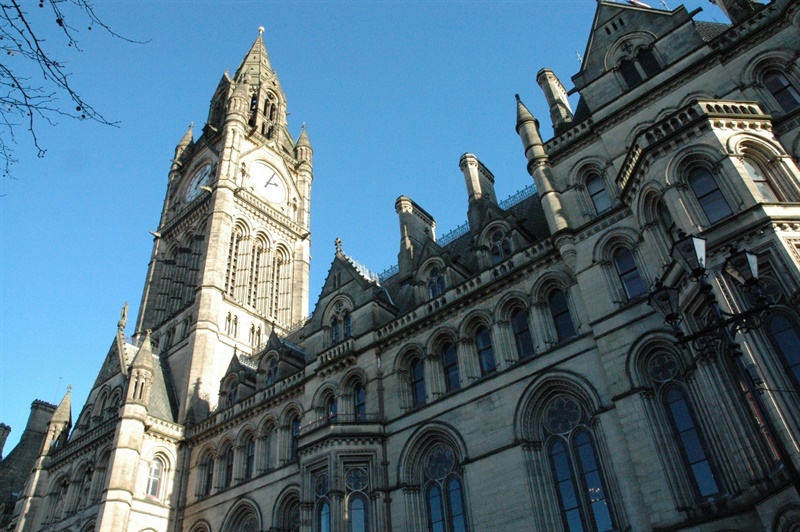03.11.14
Greater Manchester to get a mayor in return for devolution package
Greater Manchester is set to receive a multi-billion pound package of devolution from the government, in return for agreeing to institute a directly elected mayor for the region.
George Obsorne announced the plans this morning. They were finalised on Friday after the region’s 10 council leaders met in a private session to thrash out the last details.
The deal offered by the government includes a £350m Metrolink tram extension to Trafford Park, control of the region’s £500m skills budget, £300m in house building funding, power to combine health and social care funds together and a pledge to make Manchester a science capital.
In return the 10 local authority leaders have agreed to have a mayor oversee them. The mayor will sit on the existing Greater Manchester Combined Authority, which is the body powers will be devolved to, and will also take on the powers and responsibilities of the region’s police and crime commissioner.
In May 2012, the city of Manchester – just one of the 10 councils making up Greater Manchester – voted ‘no’ to having a directly-elected mayor by 53.2% to 46.8%.
The chancellor said: “This is a massive moment for the north of England and our plan to build the Northern Powerhouse. After several months of private discussions with local representatives from all three parties, I have reached agreement with the civic leaders of Greater Manchester to create the first metro-wide elected mayor outside of London. This will give Mancunians a powerful voice and bring practical improvements for local people, with better transport links, an Oyster-style travelcard, and more investment in skills and the city’s economy.
“I want to talk to other cities who are keen to follow Manchester’s lead – every city is different, and no model of local power will be the same.
“The Northern Powerhouse is becoming a reality. We plan to make major investments in northern transport and science, now we have agreement on the first metro-area mayor. This is what we’ve achieved in just a few months. Giving cities power is part of our long term economic plan to reduce the decades-old gap between north and south, London and the rest.”

Lord Peter Smith, chair of GMCA, said: “Make no mistake, this devolution settlement is a momentous moment for Greater Manchester. It gives us greater control over own destiny in several key areas and the ability to base decisions on local priorities and needs rather than on ‘one size fits all’ dictates from Westminster.
“This isn’t about taking powers from individual Greater Manchester authorities. It’s about powers coming down from central government to a more localised level.”
Manchester city council leader, Sir Richard Leese, added that the settlement was a “huge move forwards” in the regions ultimate ambition for full devolution of all £22bn of public spending in Greater Manchester.
The deal has been signed off by council leaders on the understanding it will be discussed by rank and file councillors before returning to leaders in January. The first mayor is expected to be elected in 2017 – if the Conservatives are in government.
Until then, the region will have an unelected ‘interim mayor’, appointed by the leaders themselves.
Part of the deal is a provision that once in place the mayor could be overruled if two-thirds of the council leaders disagreed with their decision. The mayor would not have a London-style elected assembly, but a cabinet comprising the 10 leaders that must be consulted on his/her strategies.
The powers the mayor would have are:
- Control of a £300m Housing Investment Fund
- Powers over strategic planning, including the power to create a statutory spatial framework for Greater Manchester. This will need to be approved by a unanimous vote of the Mayor’s Cabinet
- Responsibility for a devolved and consolidated transport budget, with a multi-year settlement to be agreed at the next Spending Review, and responsibility for franchised bus services (subject to consultation by Greater Manchester), and for integrated smart ticketing across all local modes of transport
- Control of a reformed earn back deal, within the current envelope of £30m a year for 30 years – this gives Greater Manchester the certainty they need to extend the Metrolink to Trafford Park
- Take on the role currently covered by the Police and Crime Commissioner
While the Greater Manchester Combined Authority will be devolved the following powers:
- Responsibility for securing integrated business support services, including through the Growth Accelerator, Manufacturing Advice Service and UK Trade and Investment (UKTI) Export Advice
- Control of the Apprenticeship Grant for Employers in Greater Manchester and power to re-shape and re-structure the Further Education (FE) provision within Greater Manchester
- Control of an expanded Working Well pilot, with central government funding linked to good performance up to a fixed DEL limit in return for risk sharing
- Opportunity to be a joint commissioner with Department for Work and Pensions (DWP) for the next phase of the Work Programme
- The GMCA and Greater Manchester Clinical Commissioning Groups will be invited to develop a business plan for the integration of health and social care across Greater Manchester, based on control of existing health and social care budgets
Tell us what you think – have your say below or email [email protected]